
It's been eight months since the UK voted to leave the European Union, despite a majority of voters in Scotland opting to remain. In the days after the vote, one of the big unanswered questions was if the conflicting results between Scots and voters in the rest of the UK would push Scotland towards independence.
Since then, Scotland's first minister, Nicola Sturgeon, has said another independence referendum is "highly likely", European politicians are already discussing how to fast-track Scotland's entry to the EU, and the Scottish parliament voted against triggering Article 50 in a symbolic ballot – but how do voters in Scotland feel?
Here are five things we can take away from the polling of Scottish voters since the EU referendum on June 23.
1. Despite an initial surge after the vote, Scots don't seem any more keen on becoming independent – yet.
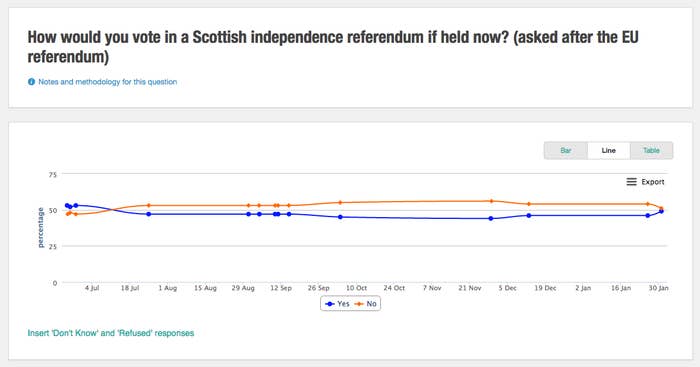
In the immediate aftermath of the Brexit vote, three successive polls showed that a majority of Scots would vote Yes in a fresh independence referendum. However, the last 12 polls in a row have showed that No has taken back a solid lead.
Taking people who are undecided out of the equation, polls for the past seven months have showed support for independence remains at around 45% – roughly where it was during the first referendum in 2014.
Having said that, the most recent poll at the end of January, released by The Herald and polling company BGM, suggested independence support had spiked to 49%, leading former first minister Alex Salmond to say it was "game on".
However, Scotland's leading polling expert Professor John Curtice dulled some of that excitement among independence supporters by saying the poll could just be the result of the random chance in all polling samples.
Curtice said: "To date at least, there is insufficient evidence to draw the conclusion that the disagreement over Brexit between the UK and the Scottish governments has altered the balance of opinion on independence."
It won't be clear if that will be a sustained spike until we see the results of a few more opinion polls, which will become particularly interesting after Theresa May triggers Article 50, starting the formal process of withdrawing from the EU.
2. There has definitely been some movement, though – the number of Remain voters who have moved to Yes is roughly equal to Leave voters who have moved to No.
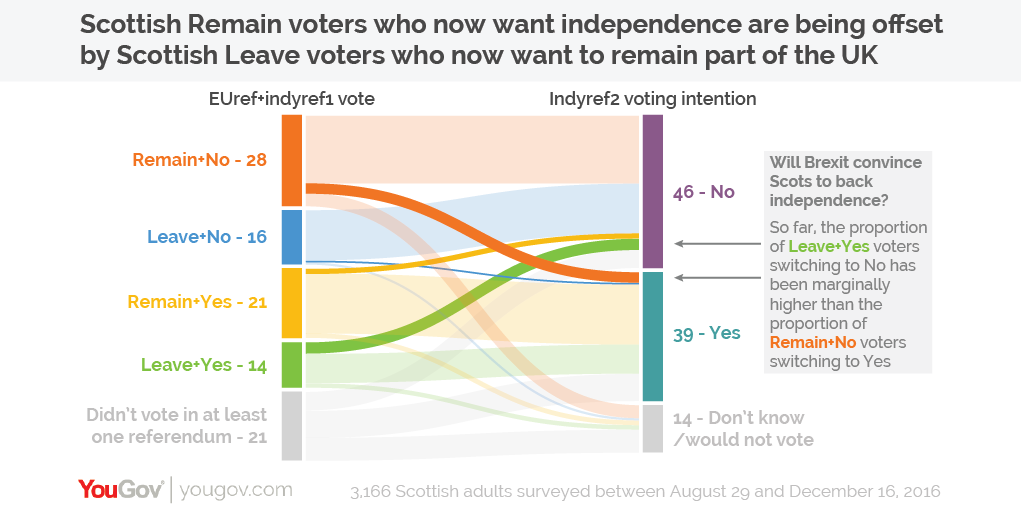
According to polling company YouGov, the lack of movement on Yes and No figures of independence opinion isn't down to no one changing their minds, but lots of people changing their minds in different ways.
The analysis suggests that there are slightly more people who voted Yes in 2014 and Leave in 2016, but who would vote No in another independence referendum, than those who voted No and Remain, but would vote Yes in IndyRef2.
As such, the new Yes voters – the ones who voted No last time but would now like to see an independent Scotland inside the EU, and the crucial swing voters Sturgeon needs – are effectively being cancelled out.
YouGov's Chris Curtis said: "The movement among [Remain and No voters] has been offset by a much larger swing amongst those that voted Yes to independence in 2014 but then voted to Leave the EU last year.
"Despite only making up 14% of Scottish voters, over 3 in 10 (35%) of these Leave and Yes voters have since abandoned their pro-independence position, with 25% now saying they would vote to stay in the Union."
According to a poll by Lord Ashcroft, over a third of SNP voters went against their party with a Leave vote last June, and it appears, so far, that some are not prepared to give up leaving the EU for the prize of Scottish independence.
3. Around half of Scottish voters don't want to have another referendum on independence anytime soon.
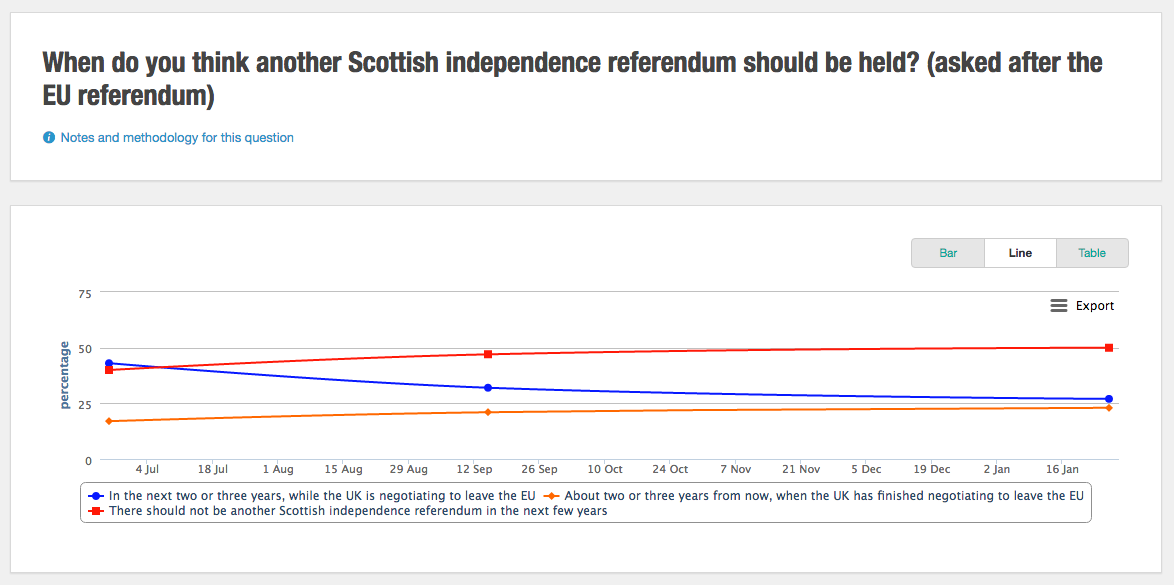
Straight after the EU referendum, it appeared that a majority of Scottish voters wanted a fresh independence vote within two or three years – however, this has significantly dropped off in the subsequent eight months.
In the three polls on the subject since the EU referendum, support for another independence referendum inside the next two or three years – while the UK government is negotiating with the other EU members – has experienced a huge drop from 43% to 27%.
However, it's not all bad news for the Scottish government, as another 23% appear to want another independence referendum a little bit further in the future after the UK has finished negotiating with the EU – which would be around two or three years from now.
Those two figures added together means there is roughly a 50/50 split between people in Scotland who want another referendum in wake of Brexit and those who don't think it's necessary.
4. The EU and independence referendums have split Scottish voters into four distinct groups.
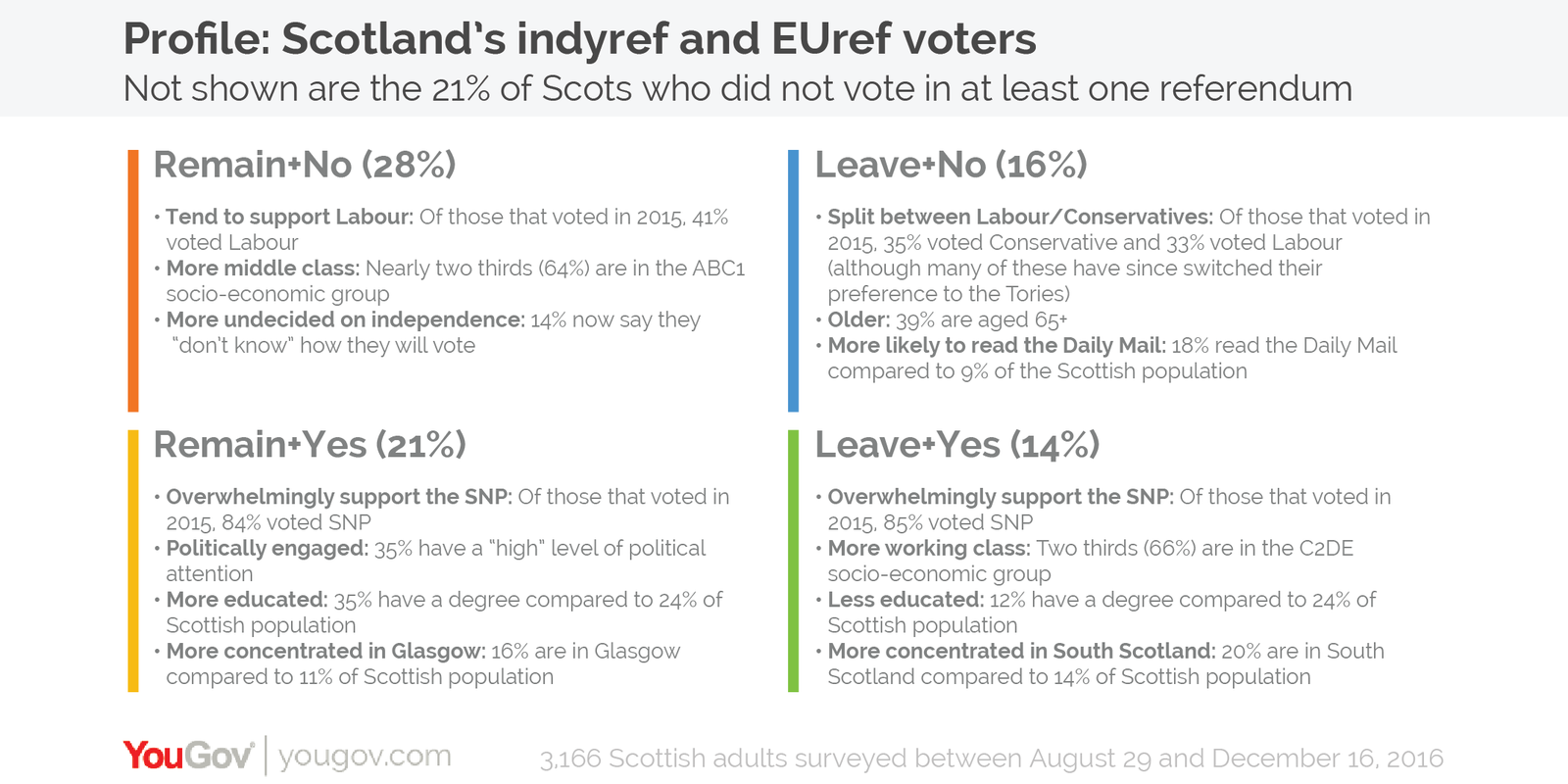
Analysis by YouGov has shown that most Scottish voters now fall into four groups: Remain and No, Leave and No, Remain and Yes, and Leave and Yes.
The analysis suggests that both groups of people who voted Yes in 2014 still overwhelmingly support the SNP. However, No voters who also opted for Remain in June are more likely to vote Labour, and No voters who chose to Leave the EU are more likely to support the Conservatives.
Moreover, and crucially for Sturgeon's hopes of winning a second independence referendum, 14% of those who voted Remain and No are now undecided about how they would vote on the independence issue next time.
It is these voters, alongside EU nationals resident in Scotland, that the SNP will hope to persuade to vote Yes and boost its support over 50% in the case of another referendum on independence in the next few years.
5. The pro-independence Scottish National Party is still Scotland's overwhelmingly dominant political force.
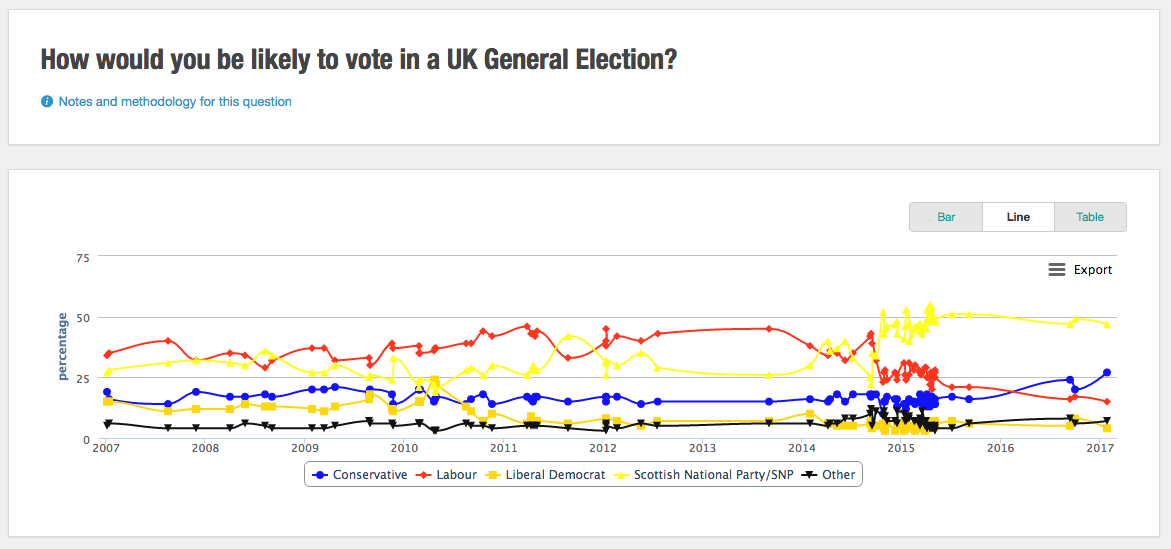
The SNP's landslide victory in the 2015 general election in Scotland, where it won 56 out of 59 seats, was only a year and a half ago. In 2016, it went on to win another Scottish election although it narrowly missed out on winning an outright majority.
The situation hasn't changed. In the most recent polls last month, 47% of respondents said they would vote SNP in another general election, which suggests it will go on to storm Scotland's upcoming local elections in May.
Another poll, carried out by Panelbase for the pro-independence site Wings Over Scotland, also showed the continuing rise of the staunchly pro-union Scottish Conservatives, who are polling on 26%.
The full results show that Ruth Davidson's Conservatives are now twice as popular as Kezia Dugdale's Labour among Scottish people who voted against independence in the last referendum in 2014.
Meanwhile, Labour's overall support has fallen to around 15%.
